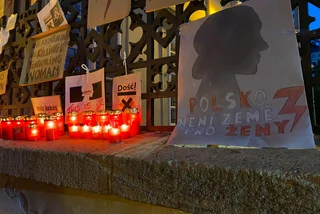The shockwaves from the U.S. Supreme Court's reversal of women's reproductive rights have spread across the Atlantic. In Europe, where conservative activists have been pushing to chip away at women's rights, many fear the U.S. abolition of women's reproductive rights could kick off a domino effect within conservative and far-right movements.
In the Czech Republic, both local and expat groups have been outraged with the U.S. Supreme Court's decision to strike down the landmark Roe v. Wade, a ruling that will restrict access to abortion in the United States as other countries broaden abortion rights.
In response, activists in the Czech Republic will demonstrate on Malostranské náměstí at 5:30 pm this Thursday. During the event, there will be speakers from Amnesty International Czech Republic, Konsent, Czech Women's Lobby, and others.
"The attack on the rights that women won decades ago cannot be taken lightly. We do not want to be and cannot be silent. If we remain silent, we may one day wake up in a country where the same thing is being discussed. In fact, successes abroad encourage activists to take similar steps to turn back the clock and take away women's rights," feminist group Konsent said on Facebook.
Originally from the United States, Bonita Rhoads has been an expat in the Czech Republic for 19 years. She and her husband Vadim were founding members of Democrats Abroad CZ and organizers of the Women’s March on Prague in 2017 because of their concern over the election of Donald Trump as U.S. president.
"Like many U.S. expats, I feel outrage and grief that so many American women now have less control over their own bodies and destinies than their mothers and even grandmothers had," Rhoads told Expats.cz.
"What’s worse is the undemocratic power being exercised to take away 50 years of women’s reproductive freedom by a tiny group of extremist judges installed by two presidents – Bush and Trump – who did not win our popular vote. It is terrifying to see how minority rule is becoming successful in the U.S., the country often looked to as the world’s model democracy," she added.
Rhoads, her husband, and a teen daughter will be joining the Thursday rally to show solidarity with women in the U.S., raise awareness of the issue in the Czech Republic, and simply express their dismay.
"I do believe that we who want to live in democracies have to get over the idea right now that democracy is something you just get to enjoy. It’s more clear than ever that your civil rights need to be defended and protected. The rights most of us have already enjoyed in our lives were won for us over centuries by people who put boots on the pavement, went to rallies, and engaged in many other kinds of activism," she said.
With many of the world's countries looking up to the United States as the model democracy, the erosion of individual rights and freedoms there threatens democracy and liberalism in Europe. "It is going to offer great comfort to some European leaders – [Hungary's] Viktor Orban, [Poland's] Andrzej Duda, [France's] Marine Le Pen," Rhoads said, encouraging people to be engaged and to support organizations.
She also noted that while Europe and North America are facing escalating aggression from autocratic forces in the world, like Putin’s Russia and China, we also have to be deeply concerned about autocratic forces from within.
Chamber of Deputies speaker Markéta Pekarová Adamová expressed her reassurance by saying the legislation in the Czech Republic is "good and there is no reason to change it."
"For women, it is a tragedy that for various reasons they have to have an abortion, but it would also be a tragedy to make it difficult for them to do so," Pekarová Adamová added.
Last year, the European Parliament proclaimed that safe access to abortion is a human right in an effort to confront countries such as Poland and Malta, where women’s rights are being restricted.
Terminating a pregnancy is legal in the Czech Republic on any grounds provided that the pregnant woman requests it in writing by the 12th week of pregnancy. It is also legal (with a physician's recommendation) until the 24th week of pregnancy if genetic testing shows a high probability that the child will have a serious handicap. An abortion may be carried out at any time during the pregnancy should grave problems be discovered in the fetus.
The abortion pill has been legal in the Czech Republic since 2014. For many women, it is a less invasive method for inducing miscarriage although the anti-choice groups opposed the registration of the pill. Abortion is not covered by health insurance unless the mother's life is in danger. Women up to the age of 18 must obtain signed permission from a guardian.
In general, the Czech Republic cannot be considered progressive when it comes to women's rights given its low ranking in the gender equality index as well as its refusal to ratify the Istanbul Convention to prevent and combat violence against women.
Rhoads also said that although women in Czechia still are faced with a great deal of intensive unpaid work in the home that makes it harder to achieve gender equality in the workplace, at least the country has reproductive freedom and now even helps many of the Polish neighbors get access to safe and legal abortion denied to them in their own country.
Despite the conservative inclinations of many government members and limited achievements in gender equality, lawyer Barbora Vráblová, who specializes in medical issues, says there is no reason to believe reproductive rights may come into question in the Czech Republic any time soon.
She notes that unlike Poland, which ranks high in religious commitment, the Czech Republic is a largely atheist country, and thus few socio-political issues are affected by religious beliefs.
Though several attempts have been made to open the legislative act to the amendment, the law has remained intact since 1986, Vráblová said.
“Some, including the Ministry of Health, are afraid once the act is open, the conservative groups may use the momentum to amend the part of the law that guarantees the quite liberal/wide access to abortions,” she said.
Meanwhile, the members of the Ciocia Czesia (Auntie Czech) collective, which helps women in need of abortion come to the Czech Republic for the procedure, remain hopeful about the future of the reproductive rights in Europe.
"As harrowing and discouraging the recent events in the U.S. are, I remain cautiously optimistic regarding the impact they might have in the global struggle for reproductive rights," Justyna, a member of the Ciocia Czesia initiative, told Expats.cz.
The collective believes that the profound differences in the political and social structures of the U.S. and Europe are important to consider. "The U.S. is a country in a very specific situation, polarized and unequal to the extent that we, as Europeans, can hardly relate to," Justyna said.
The Ciocia Czesia team believes that while the situation in the United States is still dynamic, "one thing seems to be clear – most people, both in Poland and the U.S., are against limiting their reproductive rights."
Evelyn Regner, chair of the European Parliament's Committee on Women’s Rights and Gender Equality (FEMM), called the growing financial flows originating from outside the EU – from Russia, the U.S., and elsewhere – to European anti-choice organizations, which actively work toward undermining sexual education and attack women’s right to decide over their own bodies "unacceptable."
According to the European Abortion Policies Atlas, published in 2021, legal frameworks for accessing abortions vary to a great extent among European countries. Abortion technically remains a crime in 14 of Europe's 52 countries.
"Solidarity and grassroots organization are our weapons, and collectives like ours [Ciocia Czesia] will step in when these rights are violated. Just like in the 70s, we are ready to fight, even more unashamed, unapologetic, and inclusive than before," pledge the members of the Ciocia Czesia initiative.












 Reading time: 6 minutes
Reading time: 6 minutes 





































